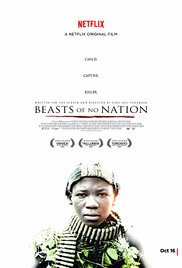
BEASTS OF NO NATION
US, 2015, 137 minutes, Colour.
Abraham Attah, Idris Elba.
Directed by Cary Joji Fukunaga.
Beasts of No Nation is a difficult film to watch, reflecting, as it does, dire situations on the continent of Africa, civil wars between government and rebels – but, especially, the taking of children and training them to be child soldiers. The film was sponsored by Netflix and received its first distribution on that network.
This is not a new theme for films – there Was Johnny Mad Dog with financial support from the government of Liberia. There was also Rebelle – the Cap Witch, filmed in Congo Kinshasa, but set in an unnamed country. In the former film the child soldier was a boy. In the latter, a girl.
One of the outstanding things about Beasts of No Nation is the central performance by Abraham Attah, convincing as a playful young child in his village, lost in the jungle, recruited and brainwashed, becoming vicious, even to hacking an engineer prisoner to death with a machete, wanting revenge on the death of his father – but all the time with a sense of God and saying prayer, even when he is ashamed of his killing.
The bulk of the cast is African with international star, Idris Elba, appearing as the Commander, a man obsessed, loyal to the Supreme Commander, indoctrinating the children, ruthless in his behaviour with them, exploiting and even abusing them, letting them play football, join in singing and communal food, but all the time making sure that they were more and more loyal to him and to his cause.
The film opens in a buffer zone which is soon under siege by both military and rebels, leading to mass exile or to brutal massacre. There are other massacre sequences throughout the film.
The tone changes towards the end of the film when the Commander brings his boys into the city to be praised by the Supreme Commander. This is not what happens. Life in the bureaucratic city is quite different from life in the bush. The Commander is kept waiting, relieved of his post and, allegedly, promoted to chief of security while his 2 IC is placed in command, something which angers the Commander and leads to further brutality.
Ultimately, the Commander is left with his boys inactive in the jungle for months until they themselves rebel against him.
There is quite some pathos as well as hope in the final sequence where the young hero is once again in safe surroundings, with other children, and working with a counsellor to overcome his traumas.
1. The impact of the film? Graphic? An African story? 21st-century? Civil wars and rebellions? Military, political? Child soldiers?
2. The African settings, the village, the buffer zone, the countryside and base camps, the war, battles? Contrast with the city, offices, government? The musical score?
3. The title, Agu and his saying that this was what the children were, that they had become beasts not belonging to the nation?
4. The introduction, the village, the family, Agu and his life, children playing, no school, ordinary life, family? The detail? His older brother, his flirting, interactions between the two? The father and his being a teacher, the mother?
5. The war situation, life in the buffer zone, between the rebels and the government forces, the church gatherings, trying to live an ordinary life? The need for getting out? The father arranging it, the mother and the baby, in the car? The boy having to stay behind? The attack, the rebels, the Army, people caught, the massacres, the father and others rounded up, being killed? Agu and his escaping, his brother’s death?
6. Agu, the screen performance, awards, his character, his age, bewildered, the break from his family? His being found?
7. The troops, their age, using weapons, the Commander and his role, testing the young boys, judging them, the Commander’s ruthlessness and killing the boy who did not meet the standard? The use of drugs? The scenes under the bridge?
8. The Commander, his motivation, character, for and against, his 2 IC, with the rest of the boys, the training, meals, play, football, the indoctrination, the motives of revenge, inciting bloodlust?
9. The political background, the Commander and his loyalty to the Commander-in-chief?
10. The guerrilla warfare, the attacks, the guns, the prisoners, Agu and his being forced to kill, the engineer, with the machete, his reluctance, his mad frenzy and hacking the prisoner?
11. Agu, his belief in God, his prayers, praying as he killed, vengeance?
12. The visual impact of the massacres?
13. The Commander, his relationship with the boys, manipulation, the equivalent of abuse?
14. Going to the city, meeting the supreme chief, having to wait, the Commander feeling insulted, bureaucracy?
15. The Supreme Commander, informing the Commander about the change, his promotion, security? The promotion of the 2 IC? The Commander arranging his death?
16. Going into exile, with the boys, the months passing, the downfall of the Commander, the boys their wanting to revolt? Turning against him?
17. Agu, the end, the boys released, his working with the counsellor, the possibilities of his recovery? Going out to be with the other children?